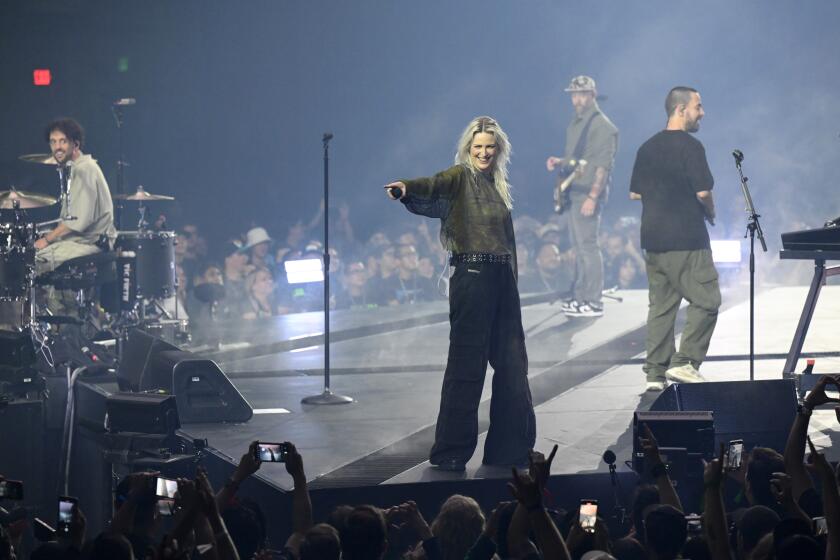DiFranco Continues Her Streak of Independence
- Share via
Considering the state of the nation these days, one might have expected socially conscious singer-songwriter Ani DiFranco to focus on the many overtly political tunes in her vast arsenal on Sunday at the Universal Amphitheatre. But as always, the independent artist went her own way, using compassion and wry wit to examine not the big political picture, but the underlying personal divides that lead to misunderstanding, prejudice and, finally, larger injustice.
“Here’s a lovely folk song about sex work,” joked DiFranco, introducing her 1994 tune “Letter to a John.” Going beyond humanizing a pariah, the ironically upbeat number limned a lap dancer’s hidden pain, pushing into a customer’s face the lifetime of humiliation and abuse behind every rote gyration, every on-cue smile.
Yet DiFranco’s detailed, stream-of-consciousness style also deftly captured various states of relationships, with others as well as with oneself. Even a soul-searching ballad as seemingly depressing as “Grey,” from her stellar new double-CD collection “Revelling/Reckoning,” was reassuring rather than bleak. And her low-key recitation of Prince’s “When You Were Mine” illuminated both the heartbreak and the resignation of loving someone so much you set her free.
Even when taking on larger issues, DiFranco wrapped them in intimate terms. The wistful “Subdivision” reflected on the toll taken by the racial and economic divides in her hometown, Buffalo, N.Y., not to mention the rest of the country.
But she was no dour doomsayer. Indeed, the diminutive performer leaped about so gleefully at first that her feet scarcely seemed to touch down. Leading her quintet of bass, keyboards, reeds, horns and drums, she played kinetic, rhythmic acoustic and occasionally electric guitar. The blend of folk, funk and jazz was alternately tightly executed and sprawling in seemingly infinite jams, with Latin flavors sometimes evoking a folkier Santana.
The group’s approach unified the sometimes disparate folky and funky halves of the new album and brought earlier works up to date. Yet in moments when DiFranco stood alone, she strummed her guitar with staccato fury, stripping back time to her beginning days as a scrappy folk singer.
Her vocals often served as another instrument, sometimes talk-singing with percussive oomph, at other times tumbling in a breathless, jazz-like near-scat, elsewhere wailing wordlessly.
Between songs she chatted amiably, at one point recalling a recent concert by veteran folk singer Ferron, whose own intimate style and early independent releases created something of a blueprint for artists such as DiFranco.
If Ferron’s work was considered “womyn’s” music in its ‘70s and ‘80s heyday, DiFranco has both inherited and transcended that role. Sure, the largely female audience drew strength and comfort from her honesty, compassion and unflinching zeal, but the men were never made to feel like perpetrators. To DiFranco, anyone who is moved by what concerns her is in the same boat.
More to Read
The biggest entertainment stories
Get our big stories about Hollywood, film, television, music, arts, culture and more right in your inbox as soon as they publish.
You may occasionally receive promotional content from the Los Angeles Times.










